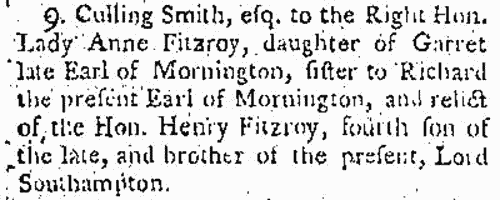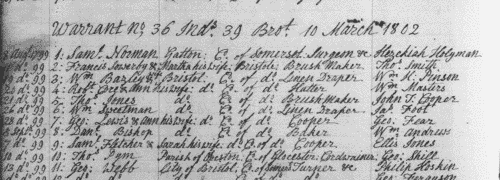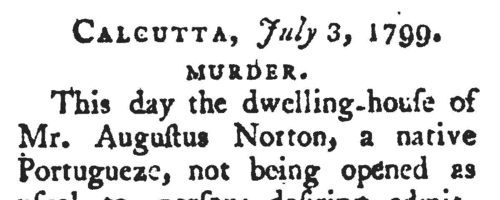Add this eBook to your basket to receive access to all 1,209 records. Our indexes include entries for the spelling paterson. In the period you have requested, we have the following 1,209 records (displaying 231 to 240): These sample scans are from the original record. You will get scans of the full pages or articles where the surname you searched for has been found. Your web browser may prevent the sample windows from opening; in this case please change your browser settings to allow pop-up windows from this site.  Masters of apprentices registered in Scotland
(1798) Masters of apprentices registered in Scotland
(1798)
Apprenticeship indentures and clerks' articles were subject to a 6d or 12d per pound stamp duty: the registers of the payments usually give the master's trade, address, and occupation, and the apprentice's name, as well as details of the date and length of the apprenticeship. There are central registers for collections of the stamp duty in London, as well as returns from collectors in the provinces. These collectors generally received duty just from their own county, but sometimes from further afield. The indentures themselves can date from a year or two earlier than this return. (The sample entry shown on this scan is taken from a Bristol return. Each entry has two scans, the other being the facing page with the details of the indenture, length of service, and payment of duty.) IR 1/69 | Sample scan, click to enlarge

| Sackville papers
(1685-1799)
R. B. Knowles of the Historical Manuscripts Commission was invited by Mrs Stopford-Sackville to examine her family papers at Drayton House in Northamptonshire; and after his death the work was continued by W. O. Hewlett and published in 1904. These were chiefly letters, reports and other official documents from and to lord George Sackville, the third son of Lionel first duke of Dorset. The papers edited in this volume relate to the Monmouth insurrection 1685-1686; letters of Mary princess of Orange to lady Mary Forester; Sackville family papers and letters 1706-1799; home affairs 1755-1784; letters from lord George to General Irwin 1761-1784; Ireland 1731-1783; the war of the Austrian Succession 1743-1748; Cherbourgh and St Malo 1758; the Seven Years War 1758-1759; Minden 1759-1760; Spain 1778-1780; prince William Henry duke of Gloucester 1771-1779; India 1776-1784; and Minorca 1776-1782. | Sample scan, click to enlarge

|  Apprentices registered in Scotland
(1799) Apprentices registered in Scotland
(1799)
Apprenticeship indentures and clerks' articles were subject to a 6d or 12d per pound stamp duty: the registers of the payments usually give the master's trade, address, and occupation, and the apprentice's name, as well as details of the date and length of the apprenticeship. There are central registers for collections of the stamp duty in London, as well as returns from collectors in the provinces. These collectors generally received duty just from their own county, but sometimes from further afield. The indentures themselves can date from a year or two earlier than this return. (The sample entry shown on this scan is taken from a Bristol return. Each entry has two scans, the other being the facing page with the details of the indenture, length of service, and payment of duty.) IR 1/69 | Sample scan, click to enlarge

| Deaths, Marriages, News and Promotions
(1799)
Death notices and obituaries, marriage and birth notices, civil and military promotions, clerical preferments and domestic occurrences, as reported in the Gentleman's Magazine. Mostly from England and Wales, but items from Ireland, Scotland and abroad.
| Sample scan, click to enlarge

| Deaths, Marriages, News and Promotions
(1799)
Death notices and obituaries, marriage and birth notices, civil and military promotions, clerical preferments and domestic occurrences, as reported in the Gentleman's Magazine. Mostly from England and Wales, but items from Ireland, Scotland and abroad.
| Sample scan, click to enlarge

| Lodging House and Boarding House Keepers in Bath
(1799)
A list of all the lodging and boarding houses in the city of Bath, street by street, with house numbers. 'The general price of Lodgings from the first of September to the 31st of May is 10s. 6d. a week for the best rooms, and 5s. 6d. for servant's rooms; the other three months, viz. June, July, and August, 7s. 6d. a week for the best rooms, and 5s. 6d. a week for servant's rooms.' | Sample scan, click to enlarge

|  Masters of apprentices registered in Scotland
(1799) Masters of apprentices registered in Scotland
(1799)
Apprenticeship indentures and clerks' articles were subject to a 6d or 12d per pound stamp duty: the registers of the payments usually give the master's trade, address, and occupation, and the apprentice's name, as well as details of the date and length of the apprenticeship. There are central registers for collections of the stamp duty in London, as well as returns from collectors in the provinces. These collectors generally received duty just from their own county, but sometimes from further afield. The indentures themselves can date from a year or two earlier than this return. (The sample entry shown on this scan is taken from a Bristol return. Each entry has two scans, the other being the facing page with the details of the indenture, length of service, and payment of duty.) IR 1/69 | Sample scan, click to enlarge

|  Apprentices registered in Scotland
(1800) Apprentices registered in Scotland
(1800)
Apprenticeship indentures and clerks' articles were subject to a 6d or 12d per pound stamp duty: the registers of the payments usually give the master's trade, address, and occupation, and the apprentice's name, as well as details of the date and length of the apprenticeship. There are central registers for collections of the stamp duty in London, as well as returns from collectors in the provinces. These collectors generally received duty just from their own county, but sometimes from further afield. The indentures themselves can date from a year or two earlier than this return. (The sample entry shown on this scan is taken from a Bristol return. Each entry has two scans, the other being the facing page with the details of the indenture, length of service, and payment of duty.) IR 1/69 | Sample scan, click to enlarge

|  Apprentices registered in Scotland
(1800) Apprentices registered in Scotland
(1800)
Apprenticeship indentures and clerks' articles were subject to a 6d or 12d per pound stamp duty: the registers of the payments usually give the master's trade, address, and occupation, and the apprentice's name, as well as details of the date and length of the apprenticeship. There are central registers for collections of the stamp duty in London, as well as returns from collectors in the provinces. These collectors generally received duty just from their own county, but sometimes from further afield. The indentures themselves can date from a year or two earlier than this return. (The sample entry shown on this scan is taken from a Bristol return. Each entry has two scans, the other being the facing page with the details of the indenture, length of service, and payment of duty.) IR 1/70 | Sample scan, click to enlarge

| British in India and Ceylon
(1800)
The Asiatic Annual Register 'or, a View of the History of Hindustan, and of the Politics, Commerce and Literature of Asia', to some extent modelled on the Annual Register itself, included an informative Chronicle section, in which are recorded births, marriages and deaths, civil and military promotions, in Bengal, Bombay and Madras presidencies and Ceylon. | Sample scan, click to enlarge

|
Research your ancestry, family history, genealogy and one-name study by direct access to original records and archives indexed by surname.
|












